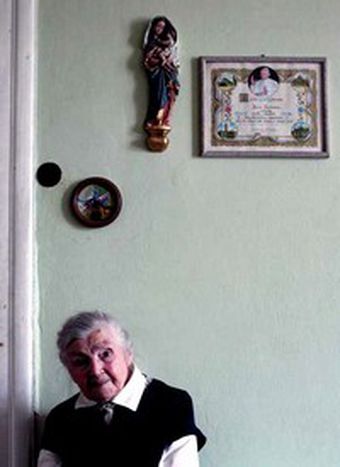
Reconciliation after the concentration camps
Published on
Translation by:
 louise burke
louise burke
Only a few former Nazi prisoners of war remain in Poland today and, with the help of organisations such as the Maximilian-Kolbe-Werk, the relationship between Poles and Germans nowadays is one of reconciliation as opposed to bitterness.
Fifty relatives and friends are gathered around Zygmunt Makowski's grave while the muted sound of Chopin's Funeral March plays in the background. Two men and a woman are standing behind the priest, flying a large flag. The textured blue and white striped flag, bearing the letter P for Pole in a red triangle, glimmers in the sun. They are representatives from an organisation for former prisoners of war who have come to pay their last respects to an ex-comrade.
This will certainly not be the last funeral of an ex-comrade that Zygmunt Kauc will attend. He is in charge of the socio-medical centre for former prisoners of war in Lodz, in Poland, which is financed by the Freiburg-based Maximilian-Kolbe-Werk organisation. "It was very important that the prisoners realised that Germans were aware of the situation and wanted to help", explains Zygmunt Kauc from his office in Lodz. There were originally 3,600 former prisoners living in Lodz; now no more than 625 remain. The older they become, the more they seek medical attention and require 'meals-on-wheels'.
Maximilian Kolbe, patron saint of prisoners of war
"When we started working here 16 years ago, we were all so young", says 81-year-old Kauc in perfect German, laughing impishly. "We are getting smaller and older every day". A picture of the Polish Franciscan Father, Maximilian Kolbe, who was ordained the "Martyr of Reconciliation" in 1982 by Pope John Paul II, hangs imposingly above a sofa in the sitting room. He became the patron saint of all former prisoners of war after sacrificing himself to save a fellow prisoner in Auschwitz in 1941.
"Dear Mum and Dad, I am well. I have chosen to work here." Censored letters sent to the families of those held prisoner at Ravensbrueck Women's Concentration Camp generally followed this structure. Halina Burdowa, who is now 94, wrote a letter which began in this very way. No mention could be made of the yellowish-brown smoke being spewed out by the crematoria. Yet despite the suffering, she feels no hatred. Many of the German prisoners got to know and admire her. The fact that Germans were also victims of Nazi violence helps to reduce the conflict between the ex-prisoners of war. For the 94-year-old lady, the Christian belief in altruism also played a crucial role in the reconciliation process. She proceeds to describe exactly how she was arrested near Danzig the very day the war broke out. The young teacher was accused of "the Polonisation of German children". She was brought to Ravensbrück, where she remained until the camp was liberated by the Red Army.
The aftermath of the forced labour camps
"The idea of going to heaven gave us the strength we needed to survive" she says with tears in her eyes. She then reveals a letter from Johannes, a new young German friend, which she fishes out from an old wooden satchel. Johannes had applied to dome some voluntary social work for the Maximilian-Kolbe-Werk organisation, and he worked in the socio-medical centre for one year. Halina had grown fond of him. Her eyes light up as she reads the letter, as if for the first time, savouring every sentence from Germany. "What a clever, young man" she says proudly as if she were talking about her own great-grandson.
Zygmunt Kauc has also lived to tell some horrifying tales. He was imprisoned for two years in the Stutthof concentration camp in Danzig, and was lucky to have survived after catching typhoid fever. Heading home to Lodz after the liberation of the camps, he refused to fight for the Red Army on the basis that he was Polish, and was held prisoner for a further 10 years in Workuta, one of the Russian forced labour camps. Many of his comrades got to know some good Germans, who gave them food or easier tasks to complete. "We soon learnt that not all Germans were bad", he explains. His beliefs stem from his very own love of life as a survivor. Hatred only causes destruction - above all the destruction of oneself.
Bullet Cases as Souvenirs
What happened during this period in history should never be forgotten. That is why days of remembrance are so important for those who survived. On the 60th anniversary of the liberation of Radogost in Lodz there is a quiet gathering. Only a three-gun salute fired by a young Polish soldier can be heard in the skies over the Apellplatz, the area where the roll call would be held. At the laying of the wreaths, several groups of school children line up behind the official representatives. One by one they apprehensively lay down daffodils in a semi circle on the memorial stone before making a prompt, almost military retreat. At the end of the ceremony, they rush forward to collect the bullet cases from the salvo that has just been fired. A group of survivors watch them attentively, hoping that the bullet cases are not the only thing that the children will take home with them today.
Translated from Versöhnung nach der Lagerhaft


